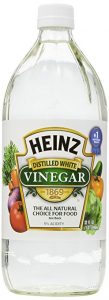
Few cleaning products in the grocery store are as cheap as white vinegar, but this simple acid is remarkably useful throughout your house, in the garage and even in the garden. Can one cheap, relatively mild product really do the job of many powerful and dangerous chemicals under my sink, you ask? Yes, and much, much more. Here are just a few of the remarkable uses for white vinegar.
Reader’s Digest had a good summary of its varied uses.
The word vinegar comes from “sour wine” in French, and is the byproduct of a common bacteria (Acetobacter) that feeds on alcohol when enough oxygen is present. The cheapest form of vinegar is distilled white vinegar made from cheap sources of sugar or starches such as grain and fruit. Distilled white vinegar has all the varied impurities removed resulting in a potent, consistent product of pure grain vinegar that is then diluted with water to 5% acidity. You may also see “cleaning vinegar” in stores which is exactly the same distilled white vinegar but with 6% acidity.
Acetic acid in vinegar makes it an excellent natural disinfectant that is effective against food-borne pathogens like E. Coli and salmonella. The acid is also good for cutting grease and dissolving basic substances like calcium deposits from hard water. There are many health benefits from consuming good quality unfiltered fruit vinegars that I will cover later, but distilled white vinegar is especially valuable for many external uses and around the home. Here are just a few:
Laundry:
Use 1/4 to 1/2 cup white vinegar in the rinse cycle of your washing machine to brighten colors instead of color-safe bleach (Note: be careful never to mix bleach and vinegar in the same load, it emits toxic chlorine gas). A similar amount in the rinse cycle is an excellent fabric softener and it will also stop static cling. A full cup in the wash cycle will disinfect—perfect for a load of cloth diapers or musty rags. A cup of vinegar will also set the colors in new clothes so you don’t have to worry about that red shirt or dark socks bleeding. Soak yellowed whites and sweat or antiperspirant stains in hot water with a little vinegar before washing to produce much w. If your washer smells musty you can clean it by running an empty cycle on the hottest setting with several cups of vinegar. Most people use too much laundry soap which leaves a scum that grows mildew.
Kitchen:
Make your dishes sparkle by adding a splash of vinegar in the rinse water or put 1/4 cup in each load of the dishwasher. Disinfect wooden cutting boards by wiping with straight vinegar. Make a general cleaning spray with a few drops of liquid detergent and 1 part vinegar to 4 parts water. Clean hard water deposits off sinks and faucets with straight vinegar and a dry rag. Wipe the fridge with half water and half white vinegar to disinfect and eliminate odors. Use straight vinegar to wipe off old grease and grimy dust from around the stove and above the fridge. Make a paste with equal parts salt and vinegar to scrub stains from dishes including pots and pans and to polish brass and copper. Polishing silver is easy with the foaming action from white vinegar and baking soda. Minor grease clogs in drains can sometimes be cleared by dumping a ½ cup of baking soda down it (with a funnel) and then pouring 1 cup of vinegar. When the foaming is done, flush with hot water.
Car:
In the winter spray your windshield every few weeks with 3 parts vinegar to 1 part water to keep frost off. Clean windshield wiper blades with straight vinegar to keep them supple so you have less streaks.
Many more uses:
Use vinegar to clean blinds, revitalize carpets, clean pet odors and urine, get rid of smoke smell, rid your pets of fleas, wash your vegetables, clean hands after working with concrete or masonry, wipe kid’s pen scribbles off the wall, and so much more. You can even make scented vinegar cleaners with citrus or natural herbs.
Be Careful of…
Don’t use vinegar on surfaces that will be etched by its acid such as cast iron or aluminum pans, stone floors, granite countertops, and ceramic tile grout. Be careful too about surfaces that are being protected by oil-based products like waxed wood, and the screens on computers or phones.
Some of these vinegar claims aren’t as effective as touted and may take longer or require multiple applications to get the desired result, but vinegar remains one of the most versatile home products—especially for the price (a gallon jug at Walmart is less than $2.50). Vinegar lasts indefinitely on the shelf, so stock up on it instead of other expensive chemicals and cleaners. [END]